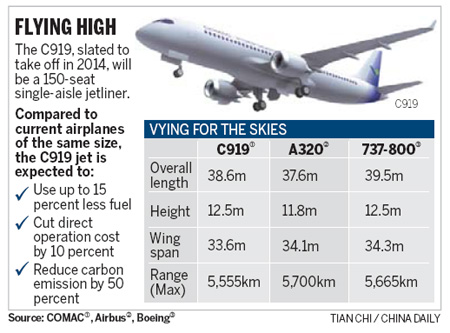State fund for homegrown jumbo jet urged
The chief designer of the country's first C919 jumbo jet has urged authorities to establish a multi-billion-yuan State fund to help boost the sales of homegrown airplanes.
More financial support from the government will bolster the domestic aviation industry, which is facing strong competition from foreign players such as Boeing and Airbus, said Wu Guanghui, vice-president of the Commercial Aircraft Corporation of China Ltd (COMAC).
![A mockup of China's homemade jumbo jet, C919, the major project of the Commercial Aircraft Corporation of China (COMAC), is displayed at the China International Industry Fair (CIIF) on November 3, 2009, in Shanghai. [Xinhua] A mockup of China's homemade jumbo jet, C919, the major project of the Commercial Aircraft Corporation of China (COMAC), is displayed at the China International Industry Fair (CIIF) on November 3, 2009, in Shanghai. [Xinhua]](http://images.china.cn/attachement/jpg/site1007/20100327/0011432100f50d17bd3809.jpg) |
| A mockup of China's homemade jumbo jet, C919, the major project of the Commercial Aircraft Corporation of China (COMAC), is displayed at the China International Industry Fair (CIIF) on November 3, 2009, in Shanghai. [Xinhua] |
China is forecast to need about 4,000 planes in the next 20 years.
Major domestic airlines such as Air China, China Eastern and China Southern, as well as Sichuan Airlines and Hainan Airlines, have expressed strong interest and support in buying his company's jumbo jet, Wu said.
The letter "C" in the title of the country's first homegrown jumbo jet is said to stand for "China" as well as "COMAC", while the first "9" implies "forever" in Chinese culture and the "19" stands for the jet's maximum 190 seats.
The single-aisle jetliner is designed for short- to medium-haul flights of up to 5,555 km.
The draft design of the country's first independently developed jumbo jet will be completed by this year and be put into production by next year, Wu had said earlier.
The plane is slated to test fly in 2014 and be ready for deliveries after 2016. COMAC, which was founded in 2008 to take charge of the country's jumbo jet project, expects to sell 2,000 C919 planes at home and abroad in the next two decades, Wu said.
"But what could harm the sales of the domestically made planes is that very few aircraft-leasing companies buy domestic airplanes and rent them to airlines," he said in an interview with China Daily.
"Leasing is the major way for airlines to expand the fleet ... and the situation will especially hinder small airlines, which are short of funds, from buying the cheaper homemade jets."
Wu suggested that the government establish a State fund of at least 30 billion yuan to help homegrown jet buyers with their financing.
The government should also give interest subsidies or exemptions through policy banks to firms and airlines that lease or use homegrown planes and airlines. Firms and airlines from both home and abroad could enjoy the policy, he said.
Currently, the government gives interest subsidies to MA60, a 50-seat turboprop manufactured by the Aviation Industry Corporation of China (AVIC). By last year, AVIC had acquired 186 orders for the planes and delivered 29 of them to users from home and abroad.
The government should extend and strengthen subsidies in the next five years for the use, lease and export of all homegrown planes, which include the C919 and another self-developed regional plane, the ARJ21, which has 70 to 90 seats and is slated to be delivered this year, Wu said.
"A team including COMAC and relative government departments is now studying the issue," he said.
Among the 1,000-strong fleet of planes now flying commercial routes in China, only four are homemade MA60 regional planes. Most are Boeing and Airbus aircraft.
As so few of the homegrown aircraft are used, it will take a long time for domestically developed commercial planes to form an effective brand, said Sun Cong, deputy chief engineer with AVIC.
"In a market dominated by companies like Boeing, Airbus and Bombadier, government support is necessary," Sun said.
All major commercial aircraft companies receive government subsidies, he said. For example, when Airbus first took off, it received government subsidies and won support from local carriers such as Air France and Germany-based Lufthansa, before gradually taking a firm place in the market.
Boeing also received direct government subsidies on various projects, including the 787 project, media reported.

 0
0 






